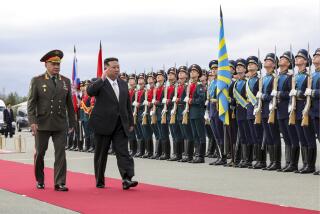With Airports Socked In, Shultz Takes a Night Train to Moscow
- Share via
HELSINKI, Finland — Secretary of State George P. Shultz cut short a planned day of preparation for climactic arms control talks Wednesday and took an overnight train to Moscow because fog closed down the Soviet capital’s three airports for a third day.
Speaking at a press conference before he left Helsinki, Shultz said that negotiations for a treaty to ban medium- and shorter-range nuclear missiles have reached “the short strokes” and could be completed during his talks today and Friday with Soviet Foreign Minister Eduard A. Shevardnadze.
“We don’t have an agreement until we have an agreement, and we don’t have one,” Shultz said. “However, we have settled all the issues of principle and are involved in the short strokes of being clear and operational on exactly what it means to implement this, that or another aspect of the treaty.”
He said the remaining issues involved the pace and method of destruction of missiles and of verification procedures.
Shultz and Shevardnadze reached agreement in principle last month in Washington on a worldwide ban on nuclear missiles with ranges between 300 and 3,000 miles. The pact would be the first U.S.-Soviet arms control agreement in eight years.
Shultz and Shevardnadze are expected to set a date for a summit meeting later this year in the United States between President Reagan and Soviet leader Mikhail S. Gorbachev, provided the arms control treaty is completed.
“I’m sure we will make headway on arms control,” Shultz said. “It is only a question of how much.”
Shultz summoned all of the Reagan Administration’s top arms control experts to a daylong strategy meeting in Helsinki. He had planned to travel to Moscow early this morning and begin talks with Shevardnadze shortly after arrival.
Thousands Stranded
However, with the Moscow airports closed because of fog, Shultz decided at midday Wednesday that his original plans would not work. Instead, he and a party of almost 200 people, including officials, clerical personnel, reporters and security agents, took an overnight train--a scheduled 12-hour trip--to the Soviet capital.
The closures at Sheremetyevo, Domdedovo and Vnukovo airports have stranded thousands of travelers--about 19,000 according to an estimate by the official news agency Tass. Radio Moscow said Moscow-bound flights were being rerouted to other cities, but airports in Leningrad were also closed.
Tass said that a soccer team from Bremen, West Germany, had been unable to reach Moscow for a game against the Moscow Spartak team and had to turn back at Vilnius in Soviet Lithuania. The fog was also blamed for a bus crash Tuesday about 20 miles outside Moscow that killed at least 11 people, according to the newspaper Soviet Russia. The bus crashed into a car, ripped through the side railing of a fog-bound bridge and plunged into the Desna River, the newspaper said.
Radio Moscow said meteorologists forecast no improvement in visibility in the next few days.
Shultz made a point about his change in itinerary, saying the effort expended to get him to Moscow was a measure of the importance the United States attaches to the talks.
‘See a Little More’
“We go to Moscow in a very serious and constructive frame of mind,” he said.
Besides, he added, the 12-hour or more train journey, via Leningrad, is “an interesting way (to go.) We see a little more of the country.”
Shultz said he hopes to complete work on the intermediate nuclear force negotiations early in his two days of talks in Moscow so he and Shevardnadze can turn to other matters, especially negotiations on limits to strategic nuclear weapons, those with ranges of more than 3,000 miles.
“We view progress on the START (strategic arms reduction talks) treaty as being of great importance,” Shultz said. “The Soviets have said that they do, too.”
However, he conceded that Moscow has not softened its refusal to conclude a strategic arms treaty until agreement is reached on defensive and space weapons. The Soviet Union is demanding severe limitations on research in the U.S. Strategic Defense Initiative program, the space-based missile defense system known as “Star Wars.” The Reagan Administration finds the limits unacceptable.
When Shevardnadze visited Washington last month, he proposed a series of highly technical restrictions on space-based weapons. At the time, some U.S. officials said the proposals would cripple the “Star Wars” program.
Shultz told his press conference, however, that there now appears to be “a little less than meets the eye” to the Soviet proposals.
“We’ve been exploring those (proposals) in Geneva, trying to pin down precisely what they mean,” Shultz said. “We’ve found that the more we try to pin it down, the less there appears to be there.” He did not elaborate.
More to Read
Sign up for Essential California
The most important California stories and recommendations in your inbox every morning.
You may occasionally receive promotional content from the Los Angeles Times.










